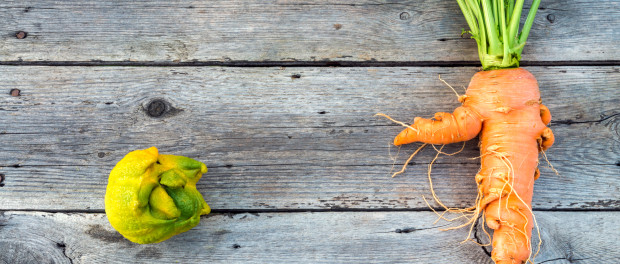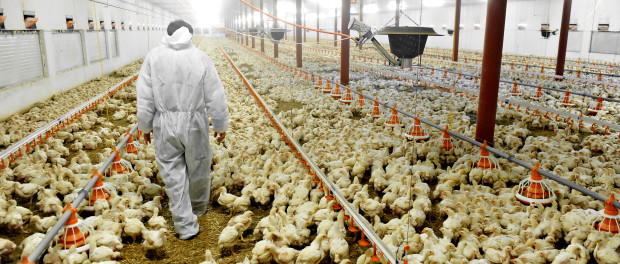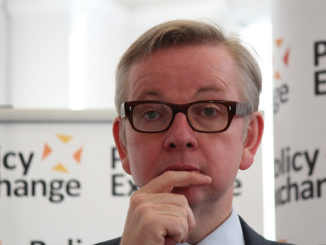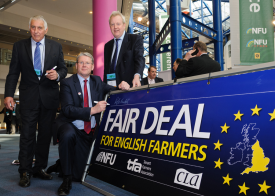The UK faces the prospect of rethinking its agriculture from scratch during the Brexit process. Less than a month after the vote, farming minister George Eustice told BBC Wales that he could not guarantee future agricultural support programmes would be as generous as current EU subsidies.

Visiting the Royal Welsh Show in Builth Wells, the junior minister’s warning flew in the face of a pre-referendum promise to Welsh farmers that there would be: “…as much support..” for agriculture post-Brexit. Even Eustice’s line manager, environment minister Andrea Leadsom pushed a similar line before the vote, saying: “The UK government will give you the same money when we leave the EU.”
A week is long time in politics, so the English cliché goes, but the Brexit vote up-ended British politics overnight. After weeks of urging voters to “take control,” the appetite of Brexiteers to take political office and deliver on their promises had mysteriously disappeared.
Theresa May’s choice of ministers for her new cabinet showed an unexpectedly Machiavellian mind at work. Appointing Brexit ringleaders to put their political careers on the line in the coming weeks marks a fine line between recklessness and madness – however it only neutralises their scope for mischief, but not ineptitude.
Leadsom’s offhand comment to The Guardian on July 14 comes to mind: “…big fields do the sheep, and those with the hill farms do the butterflies.” Running DEFRA will require sharper analysis than “…doing the butterflies…” as will negotiating the terms of the UK’s post-Brexit agriculture policy.

Rank and file UK farmers who voted to leave out of frustration with “red tape” may well discover that bureaucracy attributed to Brussels was in fact generated by “gold-plating” nearer to home. One thing the UK’s agricultural sector is agreed on, however, is that access to the single market is a vital lifeline to the farming industry heavyweights.
UK agricultural exports to the EU are currently worth GBP 18.8 billion (2014), of which GBP 10.8 billion are highly processed foods. Access to the single market will require compliance with EU expectations from farm to factory gate. In the case of Norway, policy decisions are transmitted by fax for Oslo to comply, but not to discuss or to revise.
And the evidence keeps mounting of the serious threat to the basic viability of farming – horticulturalists warn of a serious shortfall in seasonal workers, forcing them to abandon the UK; meanwhile food prices will most likely go up – without farmer profits rising concurrently – as sterling slides and costs rise.
Read: All ARC2020 articles on Brexit
Faced with the prospect of former French farm minister Michel Barnier heading the Brussels negotiating team, any case for deviating from carbon-copy compliance will need to be rock solid and argued mercilessly by DEFRA. Given the UK livestock sector’s insistence on expecting UK animal welfare standards for future pigmeat and egg imports, the word “equivalence” is unlikely to be spoken seriously on either side of the talks.

Barnier knows perfectly well the scale of capital investment required for rebuilding sheds to house breeding sows. French pig farmers never miss an opportunity to remind ministers of the price tag that came with the EU’s adoption of a stall and tether ban. Years ago, hundreds of Dutch and Danish indoor pig producers converted their holdings to ensure their UK exports complied with UK pig welfare standards. But thousands of cash-strapped pig breeders across Europe have yet to find the time and money to rebuild their sow sheds. It will be one of many sore points on both sides of the table.
At Westminster the House of Lords debated the impact of Brexit on agriculture before peers departed for their summer holidays. DEFRA’s Parliamentary Under-Secretary of State, Lord Gardiner of Kimble, deftly fielded the concerns of his “noble friends” with tea-party talk of a Great British Food Unit that is poised to launch an all-out charm offensive on an unsuspecting world.
There may not be basic payments for UK farmers in years to come, but GBP 160 million has already been earmarked: “…to be co-invested with industry to address challenges in the agritech sector.” Money talks, but not always to those who need it the most.





